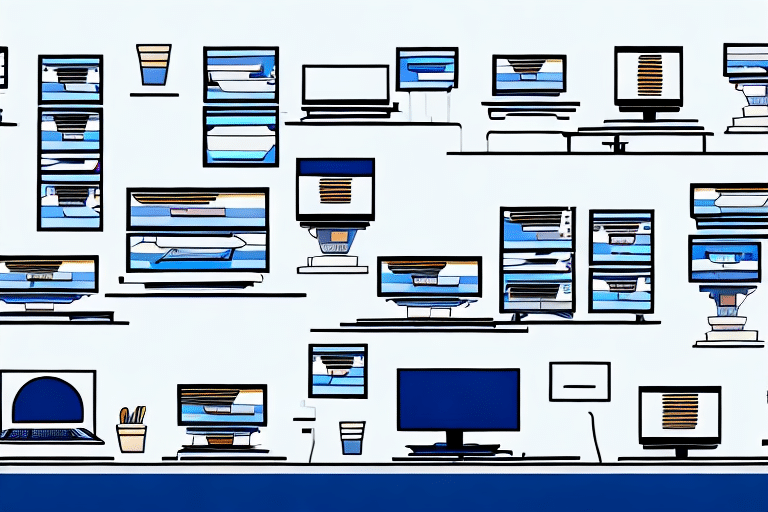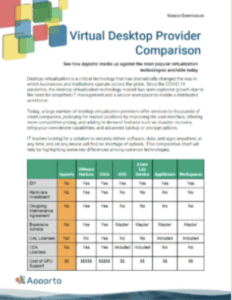VDI vs VPN vs DaaS: What Is Your Best Solution for Remote Work?
In recent years, remote work has become the norm rather than the exception. The rise of distributed teams and the increasing need for flexibility has led to the development of various remote work solutions. However, with so many different options available, it can be challenging to decide which solution is best for your business. In this article, we’ll compare three of the most popular solutions for remote work: Virtual Desktop Infrastructure (VDI), Virtual Private Network (VPN), and Desktop as a Service (DaaS).
Understanding Remote Work Solutions
Before we dive into the specifics of each solution, let’s take a moment to understand the concept of remote work solutions. Remote work solutions are tools that allow employees to access their work environment and data from any location. In other words, it’s a way for employees to work from home or other remote locations while maintaining the same level of productivity as they would in the office.
The Rise of Remote Work
The rise of remote work can be attributed to various factors such as technological advancements, changing work culture, and the need for work-life balance. According to a report by FlexJobs, the number of people working remotely in the United States has increased by 159% since 2005.
One of the main reasons for the rise of remote work is the advancement of technology. With the internet and various communication tools, it’s easier than ever for employees to work from anywhere in the world. This has opened up new opportunities for businesses to hire talented individuals from different parts of the world, regardless of their location.
Another factor contributing to the growth of remote work is the changing work culture. Many employees are looking for more flexibility in their work schedule and the ability to work from home. This is especially true for working parents who need to balance work and family responsibilities.
Finally, the need for work-life balance has become increasingly important in today’s society. With remote work, employees can eliminate the time and stress of commuting to and from work, which can lead to a better work-life balance.
The Need for Secure and Efficient Solutions
With remote work becoming more prevalent, businesses need to ensure that their employees’ work environments are secure and efficient. This is where remote work solutions come in. These tools provide employees with secure access to their work environment while ensuring that data remains protected.
One of the main concerns of remote work is security. With employees accessing company data from remote locations, there is a risk of data breaches and cyber attacks. Remote work solutions provide businesses with the tools they need to ensure that their data is secure and protected from potential threats.
In addition to security, remote work solutions also provide businesses with the tools they need to ensure that their employees are productive and efficient. These tools can include project management software, time tracking tools, and communication tools.
Overall, remote work solutions have become an essential part of modern business. They provide employees with the flexibility they need to work from anywhere while ensuring that businesses remain productive and secure.
Virtual Desktop Infrastructure (VDI)
Virtual Desktop Infrastructure (VDI) is a technology that allows users to access a virtual desktop that is hosted on a centralized server. VDI provides a secure and flexible way for employees to work remotely from anywhere with an internet connection.
VDI is a type of desktop virtualization that enables users to access a centralized desktop environment hosted on a server. Instead of accessing their desktop locally on their device, users connect to a virtual machine (VM) that contains their desktop environment, applications, and data.
One of the advantages of VDI is enhanced security. Since the virtual desktop is hosted on a centralized server, it is easier to manage and secure than individual devices. Additionally, VDI allows for centralized management, which can simplify the process of deploying and updating applications and operating systems.
Another benefit of VDI is improved scalability. Since the virtual desktop environment is hosted on a server, it can be scaled up or down to meet the needs of the organization. This makes it an ideal solution for organizations that experience fluctuations in demand or have a rapidly growing workforce.
However, there are also some downsides to VDI. One of the most significant drawbacks is the cost. Implementing and maintaining a VDI infrastructure can be expensive, and it requires specialized hardware and software. Additionally, VDI requires a reliable and high-speed internet connection, which may not be available in all locations.
Despite the costs and challenges, VDI has several use cases in various industries. For example, VDI is an excellent solution for organizations that require high-security standards, such as the healthcare industry or financial institutions. VDI can help ensure that sensitive data is stored and accessed securely.
VDI is also an ideal solution for organizations with a highly mobile workforce, such as consulting firms or sales teams. With VDI, employees can access their virtual desktop from any device with an internet connection, making it easier to work remotely or on the go.
In conclusion, VDI is a powerful technology that can provide many benefits to organizations. While it may not be the right solution for every organization, it is worth considering for those that require enhanced security, centralized management, and improved scalability.
Virtual Desktop Provider Comparison
Virtual Private Network (VPN)
VPN is a technology that allows users to connect to a private network securely over the internet. A VPN creates an encrypted tunnel between the user’s device and the private network, ensuring that any data transmitted is secure.
With the increasing number of cyberattacks and data breaches, VPN has become an essential tool for businesses and individuals to protect their sensitive information. VPN is also used by individuals who want to access content that may be restricted in their region, such as streaming services or social media platforms.
What is VPN?
A VPN is a secure connection between a user’s device and a private network, such as a corporate network. When a user connects to a VPN, their device sends data through an encrypted tunnel to the private network, ensuring that any data transmitted is secure.
The encryption used by VPN ensures that any data transmitted between the user’s device and the private network cannot be intercepted or read by unauthorized parties. This is especially important for businesses that deal with sensitive information, such as financial data or personal information of their customers.
Pros and Cons of VPN
VPN has several advantages, including enhanced security, easy accessibility, and cost-effectiveness. By using a VPN, businesses can ensure that their employees can securely access the corporate network from any location, without the need for expensive hardware or software.
However, VPN can be slower than other remote work solutions, and it requires users to have reliable internet connectivity. In addition, some VPN providers may keep logs of user activity, which can be a concern for individuals who value their privacy. Another major concern with VPN is that it does not provide any security over the endpoint device. A compromised endpoint can easily extend into the network and beyond.
Use Cases for VPN
VPN is an excellent solution for any business that requires employees to access the corporate network from remote locations. VPN is also ideal for organizations with a distributed workforce or teams that travel frequently.
Individuals can also benefit from using VPN, especially when accessing public Wi-Fi networks. Public Wi-Fi networks are often unsecured, which means that any data transmitted over these networks can be intercepted by hackers. By using a VPN, individuals can ensure that their data is encrypted and secure, even when using public Wi-Fi networks.
In summary, VPN is a powerful tool that provides enhanced security and accessibility for businesses and individuals. By using VPN, users can ensure that their data is encrypted and secure, even when accessing the internet from remote locations or public Wi-Fi networks.
Desktop as a Service (DaaS)
DaaS is a cloud computing solution that enables users to access their desktop environment from anywhere with an internet connection. The virtual desktop is hosted in the cloud, and users access it through a web browser or a dedicated client application.
What is DaaS?
DaaS is a cloud-based service that provides users with a virtual desktop environment that can be accessed from anywhere with an internet connection. The virtual desktop environment is hosted in the cloud rather than on the user’s device.
One of the benefits of DaaS is that it allows users to access their desktop environment from any device, including laptops, tablets, and smartphones. This means that users can work from anywhere, at any time, without being tied to a specific device or location.
Another advantage of DaaS is that it is highly scalable. As the needs of the business grow, additional virtual desktops can be added to the cloud environment without the need for additional hardware or software. This makes DaaS a cost-effective solution for businesses of all sizes.
Pros and Cons of DaaS
DaaS has many advantages, including scalability, cost-effectiveness, and accessibility. However, DaaS requires a reliable and high-speed internet connection, and some users may experience latency or performance issues.
One of the main benefits of DaaS is that it eliminates the need for businesses to manage and maintain their own physical desktop infrastructure. This can save businesses time and money, as they no longer need to worry about hardware upgrades, software updates, or security patches.
DaaS is quickly becoming the preferred solution for many with advantages over VDI and VPN when all factors are considered; Cost, security, scalability, performance, and end-user experience.
Use Cases for DaaS
DaaS is an excellent solution for businesses that require flexibility and scalability. DaaS is an ideal solution for organizations with a highly mobile workforce, such as consulting firms or sales teams.
Another use case for DaaS is for businesses that require a high level of security. Because the virtual desktop environment is hosted in the cloud, it can be more easily secured and monitored than a traditional desktop environment.
Finally, DaaS is a great solution for businesses that need to quickly provision new desktop environments. Because the virtual desktop environment is hosted in the cloud, new desktop environments can be created and deployed in a matter of minutes, rather than days or weeks.
In conclusion, DaaS is an innovative solution that offers businesses a flexible, scalable, and cost-effective way to provide their employees with a virtual desktop environment. While there are some potential drawbacks to DaaS, the benefits far outweigh the risks for many businesses.
Conclusion
VDI, VPN, and DaaS are three of the most popular remote work solutions, each with its own set of advantages and disadvantages. When deciding which solution is best for your business, consider factors such as security, cost, accessibility, and scalability to determine which solution will meet your specific needs. By selecting the right remote work solution, you can ensure that your employees can work productively from anywhere, while maintaining the same level of security and efficiency as they would in the office.



